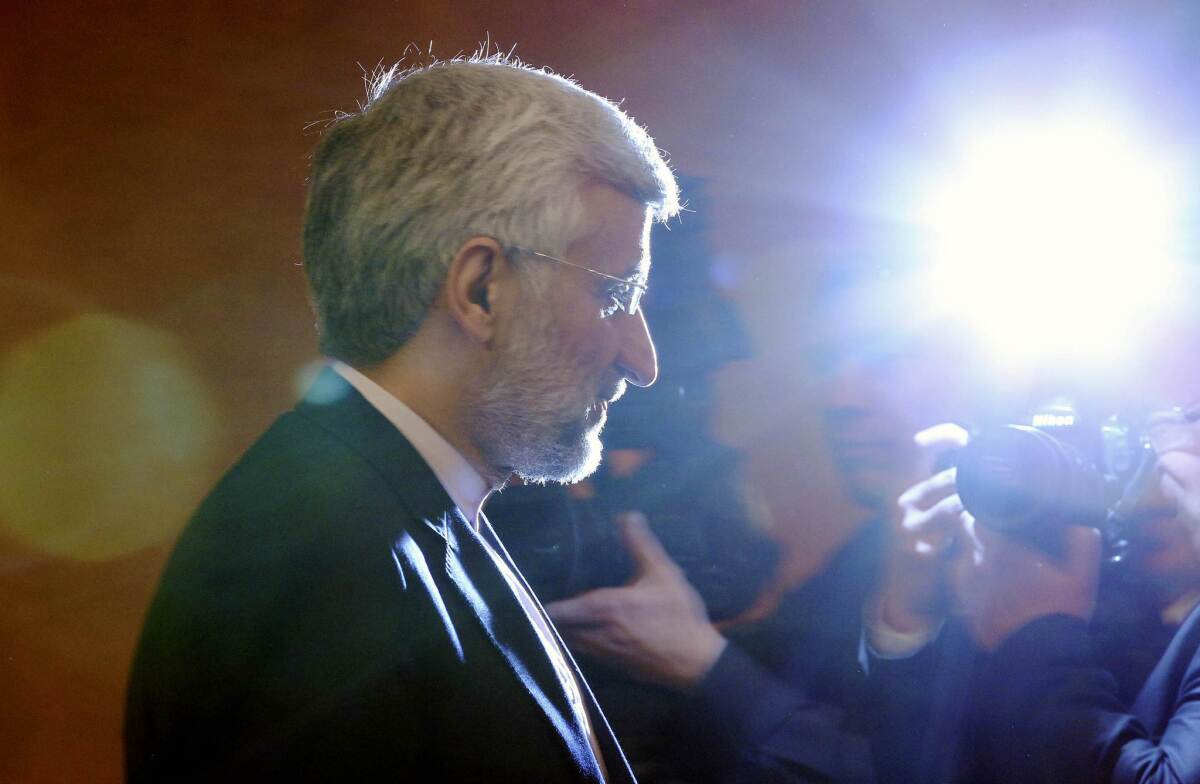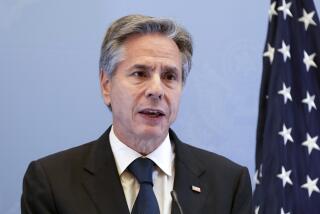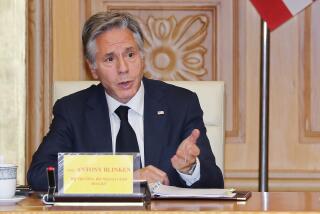Iran agrees to further nuclear talks after 6 nations ease demands

WASHINGTON — Six world powers won Iran’s promise for further negotiations over its disputed nuclear program after easing their demands for curbs on an effort they fear is aimed at giving Tehran the ability to make a bomb.
After the final sessions of two-day talks in Almaty, the Kazakh capital, Iran agreed to lower-level meeting next month in Istanbul and another high-level meeting in early April back in Kazakhstan. Saeed Jalili, the usually harsh top Iranian negotiator, praised the six powers for what he described as movement toward the Iranian position.
The new offer from so-called Five Plus One world powers -- the United States, China, Russia, France, Britain and Germany -- contained some shifts that may unsettle Israelis and American conservatives.
In a new negotiating offer, the group is asking Iran to suspend operations at the key nuclear plant at Fordo, but not permanently close the bomb-resistant underground facility. They are asking Iran to get rid of most, but not all, of the uranium stockpile that is near weapons grade. Iran would be allowed to keep a small amount as fuel for a reactor that produces radioactive isotopes it says are for medical uses.
The group is also offering a slight easing of the powerful economic sanctions that have battered the Iranian economy. They would allow Iran, which has been largely cut off from world trade, to use gold and other precious metals in dealings with other countries.
[Updated 11:13 a.m. Feb. 27: A senior U.S. official told reporters in Almaty that the new proposal would suspend “a number of significant U.S. and EU sanctions” but declined to identify them. The official said that, contrary to earlier statements by other diplomats, there would be no lifting of the “underlying, fundamental” petrochemical and banking sanctions, which have been central to the sanctions program.]
Diplomats from the group denied that the new offer represented an easing of its position, insisting that it would still require Iranian action on the most urgent issue: halting production of the near-bomb grade uranium and removing most of Tehran’s stockpile of the material. [Updated 11:13 a.m. Feb. 27: They said the proposal included new requirements that would make it easier for world powers to spot any sign that Iran had decided to try to complete a bomb.
In Jerusalem, Israeli Prime Minister Benjamin Netanyahu said Wednesday that sanctions should be tightened, not relaxed, and backed up by the threat of a military strike.
“Like North Korea, it continues to defy all the international standards and I believe that this requires the international community to ratchet up its sanctions and make clear that if this continues there will be also a credible military sanction,” he said.]
A senior Senate Republican aide said the news “is startling to many in Washington and certainly in Jerusalem where decisions of war and peace are nearing final calculation. The gold sanctions relief being offered would blow a hole straight through our final sanctions and meanwhile Iran would keep its capacity to enrich [uranium] at 20% or higher.”
Cliff Kupchan, of the Eurasia Group consulting firm, said that while many details of the world powers’ offer remain murky, it does include “an important ramping back” of negotiating demands that he predicted would set off a debate in the United States.
But Kupchan, a former State Department official, said he saw at least limited progress in the discussions, which made no headway in three high-level meetings last year. After 10 years of talks between Iran and world powers, he said, “we are seeing the first signs of a more gradualist discussion, instead of maximalist demands.” He attributed this to the end of the U.S. election cycle, which had limited President Obama’s flexibility, and the sanctions’ damaging effects on Iran.
Yet diplomats and analysts acknowledged that Iran, despite its more positive atmospherics, has not yet committed to any concessions. Western diplomats described the meetings as useful, but stopped short of saying, as the Iranians did, that their outcome was positive.
They acknowledged that Iran could come back in April with an unacceptable proposal that would again cause the negotiations to come to a halt.
Catherine Ashton, the European Union foreign policy chief, who is point person for the six nations, said in a statement that the meetings had created a “process” for further talks, but notably did not say she was now optimistic.
“Real optimism will come when we start to see progress really being made,” she said.
ALSO:
Kerry confronts clashing interests in Syria, Iran and Russia
Thousands jam St. Peter’s Square for pope’s last general audience
Three dead as gunman opens fire on colleagues at Swiss business
More to Read
Start your day right
Sign up for Essential California for news, features and recommendations from the L.A. Times and beyond in your inbox six days a week.
You may occasionally receive promotional content from the Los Angeles Times.







